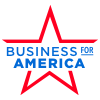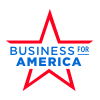Across the Aisle: Top 10 Takeaways for Business Building Bipartisanship
Amid the division and disruption in our workplaces, communities, and politics, leaders in business and government are stepping up. In Washington, D.C., Business for America convened a community of those leaders to show what’s possible.
At Across the Aisle: How Leaders Find Common Ground in a Divided Era, business, government, and public affairs professionals gathered for an afternoon of candid conversation and real solutions. The event featured members of Congress from both parties, corporate leaders from Cummins, International Paper, Johnsonville, and Salesforce, and public affairs veterans from the George Washington University Graduate School of Political Management.
We came together to ask important questions: What role should business play in politics? What does effective engagement look like in this era of distrust, gridlock, and rising political risk? And how can business leaders help rebuild the political center — where collaboration and progress can still thrive?
Our Top 10 Takeaways
In response to these questions, we heard from a wide range of voices — corporate leaders, policy experts, and brand strategists — each offering a unique perspective on the role of business in a divided era. Together with our audience, we surfaced the most resonant ideas and recurring themes.
Here are Our Top 10 Takeaways — real-world takeaways that reflect the courage, creativity, and civic leadership we need from business right now.
1. Business Is a Stabilizing Force in Turbulent Times
When institutions falter, business can lead. Business leaders aren’t just economic actors — they’re civic leaders too. By showing up with integrity and pragmatism, they can foster trust, model respectful engagement, and help reinforce democratic norms.
2. The Risk Isn’t Speaking Up — It’s Staying Silent
Silence is not a strategy. Doug Pinkham, former CEO of the Public Affairs Council, reminded us that inaction isn’t neutral: “This is not a time to hide under a tree, keeping your head down, waiting for the storm to pass.” The companies that thrive in the long run are those that speak with purpose and engage with principle.
3. Political Instability Is an Economic Risk
Healthy democracies make for healthy economies. As Charles McCray of Salesforce put it, “Businesses tend to do well in stable democracies.” Supporting bipartisan policy initiatives like the Electoral Count Reform Act isn’t just civic — it’s smart risk management.
4. Expertise Is a Civic Responsibility
Business brings knowledge government needs. With limited congressional staff and technical capacity, policymakers depend on outside expertise. “You need business to come in and lend their expertise,” McCray said — especially on complex, emerging issues where stakes are high and misinformation is rampant.
5. Values Drive Engagement
Know your north star before the storm hits. At Cummins, Hassan Christian explained how clear internal values guide when and how they speak up. “We don’t speak out just to make a statement,” he said. “But when something threatens our culture, we’re ready.”
6. Engagement Should Be Bipartisan and Personal
Relationships are built face-to-face. Meaghan Joyce of International Paper shared how site visits help lawmakers understand their impact: “They say, ‘I’ve driven by this place and didn’t know what went on inside.’” That connection opens the door to common ground.
7. Brands Can Help Rehumanize Public Life
Culture change doesn’t only come from policy. Johnsonville’s “Keep it Juicy” campaign reminded us that brands can use their platforms to build connection and reduce polarization. As Johnsonville VP of Marketing Jamie Schmelzer put it, “Rage dries us out. Connection keeps us juicy.”
8. Bipartisanship Isn’t Naive — It’s Necessary
Working across the aisle is how progress happens. Senior staffers from the offices of U.S. Representatives Don Bacon (R-NE) and Chrissy Houlahan (D-PA) emphasized that productive policy work requires trust, listening, and shared goals. The most effective business advocates aren’t aligned with one party — they build credibility across the spectrum.
9. There’s No Playbook — But There Is a Path
This moment calls for creativity, courage, and collaboration. As Sarah Bonk, BFA’s founder and CEO, reminded us: “Business has a unique and powerful role to play.” Whether it’s employee engagement, nonpartisan advocacy, or brand storytelling, the tools are already in our hands. The challenge is using them in new ways to support civic trust and democratic resilience.
10. Business Engagement Can’t Wait
It’s time to take action. As U.S. Congressman Johnny Olszewski put it, “We are truly at an inflection point.” Polarization is rising, trust is eroding, and the cost of inaction is growing. Business leaders have the credibility and capacity to foster collaboration and rebuild confidence in our systems. The moment to step up isn’t someday — it’s now.
What We Heard: It’s Go Time for Business Leadership
We opened the event with a live poll and 87% of attendees agreed: business shouldn’t sit on the sidelines — it should lead. Whether quietly supporting civic principles or boldly engaging on policy, the mandate was clear.
By the end of the event, 93% said they felt inspired, hopeful, or fired up to take action. That momentum is real — and it’s just the beginning.
At Business for America, we’re not just making the case for engagement — we’re building a blueprint for action, one where business leads the way in bridging divides and rebuilding trust in our country. We’re committed to helping your organization lead this charge. But we can’t do it alone.
Join us. Let’s turn this energy into impact — and show what’s possible when business leads with courage and common ground.
• • •
Ready to step up? Reach out and let’s get to work.

